高中英语(外研版)选修8第1-2模块基础训练与能力测试.
- 格式:doc
- 大小:267.50 KB
- 文档页数:24
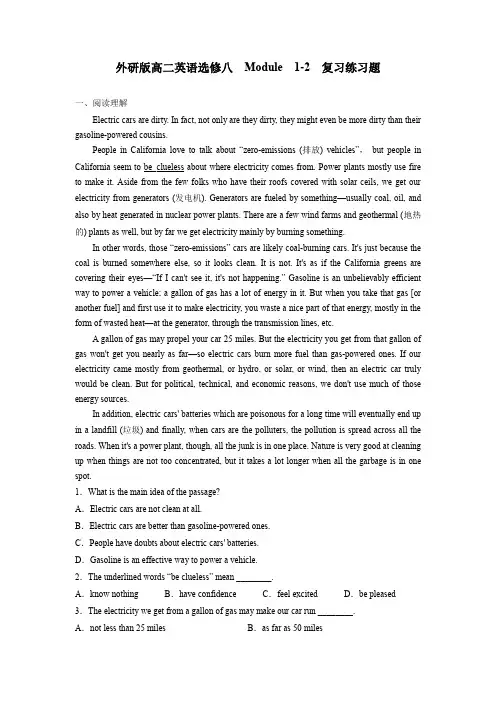
外研版高二英语选修八Module 1-2 复习练习题一、阅读理解Electric cars are dirty. In fact, not only are they dirty, they might even be more dirty than their gasolinepowered cousins.People in California love to talk about “zeroemissions (排放) vehicles”,but people in California seem to be_clueless about where electricity comes from. Power plants mostly use fire to make it. Aside from the few folks who have their roofs covered with solar ceils, we get our electricity from generators (发电机). Generators are fueled by something—usually coal, oil, and also by heat generated in nuclear power plants. There are a few wind farms and geothermal (地热的) plants as well, but by far we get electricity mainly by burning something.In other words, those “zeroemissions” cars are likely coalburning cars. It's just because the coal is burned somewhere else, so it looks clean. It is not. It's as if the California greens are covering their eyes—“If I can't see it, it's not happening.” Gasoline is an unbelievably efficient way to power a vehicle; a gallon of gas has a lot of energy in it. But when you take that gas [or another fuel] and first use it to make electricity, you waste a nice part of that energy, mostly in the form of wasted heat—at the generator, through the transmission lines, etc.A gallon of gas may propel your car 25 miles. But the electricity you get from that gallon of gas won't get you nearly as far—so electric cars burn more fuel than gaspowered ones. If our electricity came mostly from geothermal, or hydro, or solar, or wind, then an electric car truly would be clean. But for political, technical, and economic reasons, we don't use much of those energy sources.In addition, electric cars' batteries which are poisonous for a long time will eventually end up in a landfill (垃圾) and finally, when cars are the polluters, the pollution is spread across all the roads. When it's a power plant, though, all the junk is in one place. Nature is very good at cleaning up when things are not too concentrated, but it takes a lot longer when all the garbage is in one spot.1.What is the main idea of the passage?A.Electric cars are not clean at all.B.Electric cars are better than gasolinepowered ones.C.People have doubts about electric cars' batteries.D.Gasoline is an effective way to power a vehicle.2.The underlined words “be clueless” mean ________.A.know nothing B.have confidence C.feel excited D.be pleased 3.The electricity we get from a gallon of gas may make our car run ________.A.not less than 25 miles B.as far as 50 milesC.as far as 25 miles D.not more than 25 miles4.According to the passage, electric cars ________.A.are more environmentally friendly B.burn more fuel than gaspowered onesC.are very good at cleaning up D.are poisonous for a long time二、完形填空My daughter is a single parent. She works hard to __1__ for herself and her three young sons. She budgets carefully and __2__ to plan for the little luxuries (奢侈品) and treats that others take for granted. When her eldest son, David, wanted a __3__ so that he could do an afterschool newspaper delivery job, she __4__ and soon, he was the proud __5__ of a good secondhand bike.One afternoon, my daughter asked David to go to a local shop. He rode his bicycle, __6__ foolishly left it outside the shop without __7__ it up. When David came out of the shop, it was __8__. He walked home in __9__ and then, together with his frustrated mother, went to the local police station to report the __10__.Imagine their __11__ when they arrived at the station: a car parked out front had David's bike wedged (挤进) in its boot (汽车后部的行李箱). The __12__ told them how he'd seen a group of kids __13__ the bike once my grandson had gone inside the shop.The driverin his late teens himselfhad called out to them to “leave that bike __14__!” Despite this, one member of the group __15__ on the bicycle and rode it away while the others followed. Not to be __16__,the teen got in his car, drove after them and __17__ that they give the stolen bike back.He was happy to be able to __18__ it to my grandson together with a lecture (echoed by the policeman and his mother) about the silliness of __19__ to use the bike lock. __20__,in all the excitement, he slipped away, without even giving them his name or telephone number.1.A. stand B.provide C.change D.watch2.A. permits B.refuses C.manages D.decides3.A. bicycle B.watch C.phone D.backpack4.A. gave out B.set aside C.saved up D.worked up5.A.driver B.worker C.seller D.owner6.A. and B.but C.so D.when7.A. locking B.picking C.covering D.hiding8.A. left B.missed C.broken D.gone9.A. surprise B.trouble C.tears D.peace10.A. danger B.theft C.accident D.fight11.A. joy B.regret C.anger D.disappointment 12.A. policeman B.manager C.teacher D.driver13.A. ride B.fix C.steal D.knock14.A. out B.off C.away D.alone15.A. jumped B.touched C.walked D.moved16.A. annoyed B.angry C.confused D.discouraged17.A. advised B.demanded C.forced D.promised18.A. donate B.explain C.return D.pass19.A. learning B.teaching C.reminding D.failing20.A. Besides B.Then C.Finally D.Therefore三、七选五根据短文内容,从短文后的选项中选出能填入空白处的最佳选项。
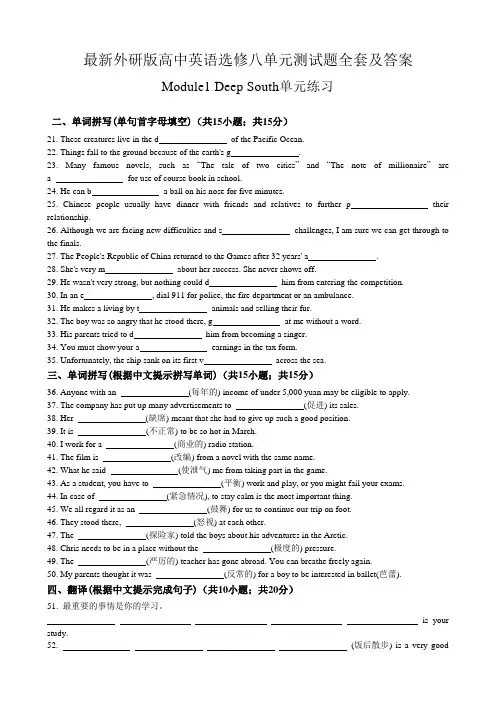
最新外研版高中英语选修八单元测试题全套及答案Module1 Deep South单元练习二、单词拼写(单句首字母填空)(共15小题;共15分)21. These creatures live in the d of the Pacific Ocean.22. Things fall to the ground because of the earth's g .23. Many famous novels, such as “The tale of two cities”and “The note of millionaire”area for use of course book in school.24. He can b a ball on his nose for five minutes.25. Chinese people usually have dinner with friends and relatives to further p their relationship.26. Although we are facing new difficulties and s challenges, I am sure we can get through to the finals.27. The People's Republic of China returned to the Games after 32 years' a .28. She's very m about her success. She never shows off.29. He wasn't very strong, but nothing could d him from entering the competition.30. In an e , dial 911 for police, the fire department or an ambulance.31. He makes a living by t animals and selling their fur.32. The boy was so angry that he stood there, g at me without a word.33. His parents tried to d him from becoming a singer.34. You must show your a earnings in the tax form.35. Unfortunately, the ship sank on its first v across the sea.三、单词拼写(根据中文提示拼写单词)(共15小题;共15分)36. Anyone with an (每年的) income of under 5,000 yuan may be eligible to apply.37. The company has put up many advertisements to (促进) its sales.38. Her (缺席) meant that she had to give up such a good position.39. It is (不正常) to be so hot in March.40. I work for a (商业的) radio station.41. The film is (改编) from a novel with the same name.42. What he said (使泄气) me from taking part in the game.43. As a student, you have to (平衡) work and play, or you might fail your exams.44. In case of (紧急情况), to stay calm is the most important thing.45. We all regard it as an (鼓舞) for us to continue our trip on foot.46. They stood there, (怒视) at each other.47. The (探险家) told the boys about his adventures in the Arctic.48. Chris needs to be in a place without the (极度的) pressure.49. The (严厉的) teacher has gone abroad. You can breathe freely again.50. My parents thought it was (反常的) for a boy to be interested in ballet(芭蕾).四、翻译(根据中文提示完成句子)(共10小题;共20分)51. 最重要的事情是你的学习。
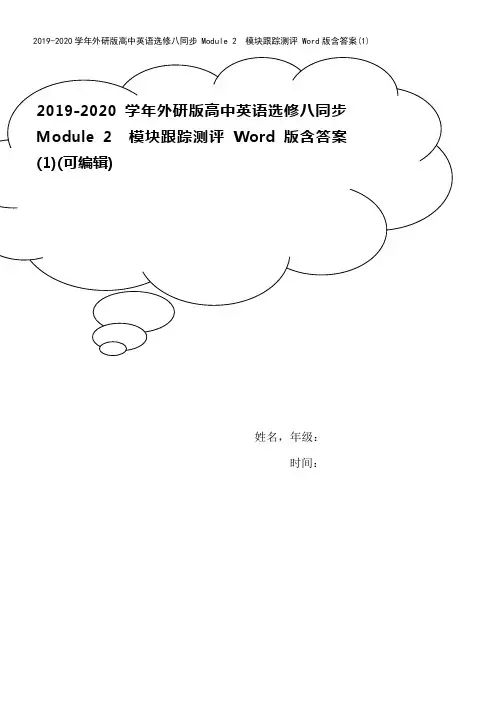
姓名,年级:时间:Module 2 模块跟踪测评(总分:150分时间:120分钟)第一部分听力(共两节,满分30分)第一节(共5小题;每小题1。
5分,满分7.5分)听下面5段对话。
每段对话后有一个小题,从题中所给的 A、B、C 三个选项中选出最佳选项,并标在试卷的相应位置。
听完每段对话后,你都有10秒钟的时间来回答有关小题和阅读下一小题。
每段对话仅读一遍.1.What are the two speakers doing at the moment?A.Drinking coffee.B.Doing the shopping.C.Seeing the doctor.答案 A2.What does the man mean?A.It's easy to forget the key.B.People often make the same mistakes。
C.He takes the key out of the room.答案 B3.How long will the man have to wait for the next bus?A.25 minutes.B.20 minutes。
C.15 minutes.答案 C4.Where does the conversation probably take place?A.In the car。
B.On the bus。
C.Outside of the lift.答案 C5.Why is the man so excited?A.He has got married.B.He has moved into a new house.C.His small cold house has been sold.答案 B第二节(共15小题;每小题1.5分,满分22。
5分)听下面5段对话或独白。
每段对话或独白后有几个小题,从题中所给的A、B、C三个选项中选出最佳选项,并标在试卷的相应位置。
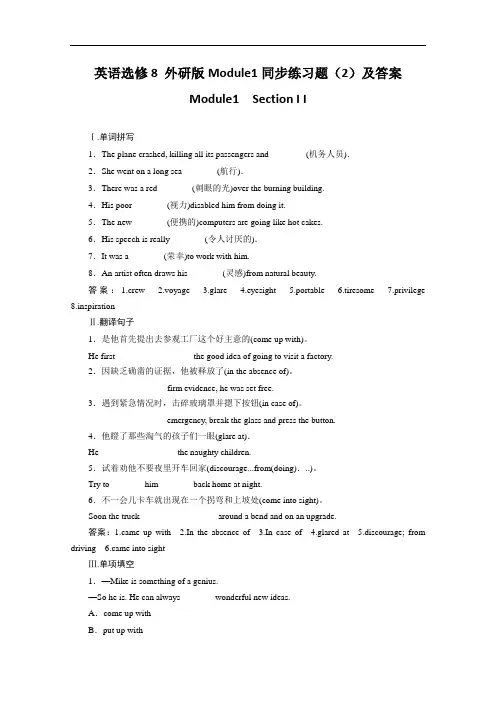
英语选修8 外研版Module1同步练习题(2)及答案Module1 Section I IⅠ.单词拼写1.The plane crashed, killing all its passengers and ________(机务人员).2.She went on a long sea________(航行).3.There was a red________(刺眼的光)over the burning building.4.His poor________(视力)disabled him from doing it.5.The new________(便携的)computers are going like hot cakes.6.His speech is really________(令人讨厌的).7.It was a________(荣幸)to work with him.8.An artist often draws his________(灵感)from natural beauty.答案:1.crew 2.voyage 3.glare 4.eyesight 5.portable 6.tiresome7.privilege 8.inspirationⅡ.翻译句子1.是他首先提出去参观工厂这个好主意的(come up with)。
He first__________________the good idea of going to visit a factory.2.因缺乏确凿的证据,他被释放了(in the absence of)。
__________________firm evidence, he was set free.3.遇到紧急情况时,击碎玻璃罩并摁下按钮(in case of)。
__________________emergency, break the glass and press the button.4.他瞪了那些淘气的孩子们一眼(glare at).He__________________the naughty children.5.试着劝他不要夜里开车回家(discourage...from(doing)...)。
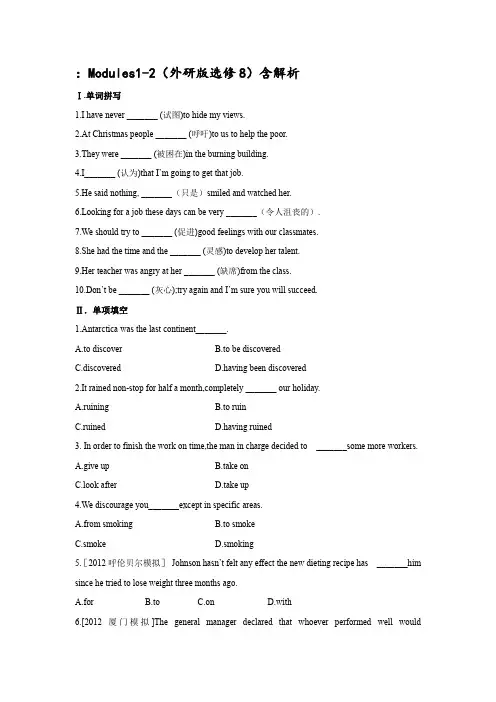
:Modules1-2(外研版选修8)含解析Ⅰ.单词拼写1.I have never _______ (试图)to hide my views.2.At Christmas people _______ (呼吁)to us to help the poor.3.They were _______ (被困在)in the burning building.4.I_______ (认为)that I’m going to get that job.5.He said nothing, _______(只是)smiled and watched her.6.Looking for a job these days can be very _______(令人沮丧的).7.We should try to _______ (促进)good feelings with our classmates.8.She had the time and the _______ (灵感)to develop her talent.9.Her teacher was angry at her _______ (缺席)from the class.10.Don’t be _______ (灰心);try again and I’m sure you will succeed.Ⅱ.单项填空1.Antarctica was the last continent_______.A.to discoverB.to be discoveredC.discoveredD.having been discovered2.It rained non-stop for half a month,completely _______ our holiday.A.ruiningB.to ruinC.ruinedD.having ruined3. In order to finish the work on time,the man in charge decided to _______some more workers.A.give upB.take onC.look afterD.take up4.We discourage you_______except in specific areas.A.from smokingB.to smokeC.smokeD.smoking5.[2012呼伦贝尔模拟]Johnson hasn’t felt any effect the new dieting recipe has _______him since he tried to lose weight three months ago.A.forB.toC.onD.with6.[2012厦门模拟]The general manager declared that whoever performed well wouldbe_______to a higher position.A.evolvedB.promotedC.dominatedD.allocated7.—It is reported that several traffic accidents occurred in the highway on October 7.—In my view,it was not the passengers but the drivers who_______for them.A.were blamedB.were to blameC.were to be blamedD.was to blame8.[2012锦州模拟]In the past,he rarely spoke unless others were speaking about something that_______to him.A.tendedB.addictedC.appealedD.applied9.[2012赣州模拟]Many people are quite at a loss as to what to do_______fire.A.in honour ofB.in need ofC.in case ofD.in the form of10.[2012邢台模拟]Pack up the items you’d like to take along and leave _______ those you dislike taking with you on your journey.A.aloneB.behindC.offD.out11.They are_______the most reasonable diet which will do good to their health.A.seekingB.stimulatingC.shapingD.sinking12.Even though he has lived in China for many years,Mark still cannot _______ himself to the Chinese customs.A.applyB.admitC.adaptD.accept13. _______of all the staff,I would like to wish you a happy retirement.A.In placeB.On accountC.On behalfD.In honour14.—How could you _______ your friend so easily?—She is the kind of person who ________ in a crowd.A.pick out;stands outB.make out;stands forC.take out;stands byD.bring out;stands aside15.When he_______this foreign country,he missed his parents very much.A.set off forB.set foot onC.set aboutD.set sailⅢ.完形填空It was a cold and windy fall day.I,a fourth-grade pupil,jumped out of the car.“Bye Mom!” I yelled as she1 away.I ran in the front doors and saw my friends waiting for me.We started to walk down the2 to our classroom.The hallway was so loud as usual and you could3 hear yourself think.My friend Casey said to me “Erin,your shoelace is4 .” “I will tie it when we get in the classroom,thanks though.” I replied.Well,I was5 .We were still walking to our class and my friend Jenny was telling us 6 .As we were walking and laughing I stepped on my shoelace and 7 on my face.”Are you okay Erin?” my friends asked me.Well,I wasn’t because I had a bloody nose and blood8 on my uniform.I looked up from the floor and I saw everyone was staring at me.I 9 and tied my shoelace,put my backpack back on my back,and ran to my classroom.I didn’t10 anything to my friends.I put my stuff at my desk when I got in the classroom,got a 11 for my nose,and went up to the teacher and asked for a nurse’s pass to get my nose12 up.When I left the teacher,I saw my friends.I walked 13 by because I didn’t say anything to them.They were laughing and I thought they were laughing at me so I didn’t talk to them for the rest of the14 .During lunch they came up to me and asked “So how is your15 ?” “Fine!” I yelled,“I saw you laughing at me when I was on my way to the 16 .” “We weren’t laughing at you.Jenny told another joke.” My friends said.“Well,I was17 at you because I thought you were laughing at me.I’m sorry,do you guys18 me?” “Yes,we forgive you.But next time you should ask us 19 you assume something.” My friends said.“Ok guys,want to play soccer?” I asked,“Sure!” they said and then we went outside to 20 the soccer ball happily.1.A.drove B.walked C.flew D.went2.A.road B.hallwayC.front doorD.path3.A.properly B.relativelyC.ridiculouslyD.barely4.A.unfitted B.unbearableC.untiedD.uncomfortable5.A.wrong B.upset C.vain D.sure6.A.stories B.jokes C.lies D.factsy B.slided C.fell D.stood8.A.attached B.stuckC.flashedD.got9.A.got up B.turned upC.showed upD.took up10.A.demand B.tellC.sayD.do11.A.backpack B.shoelaceC.uniformD.tissue12.A.bandaged B.cleanedC.washedD.wounded13.A.directly B.brilliantlyC.elegantlyD.cautiously14.A.day B.morningC.afternoonD.fall15.A.face B.pass C.nose D.foot16.A.teacher B.nurseC.classroomD.office17.A.mad B.exhaustedC.dissatisfiedD.rude18.A.swear B.punishC.evaluateD.forgive19.A.until B.before C.if D.unless20.A.squeeze B.seize C.kick D.playⅣ. 短文改错假定英语课上老师要求同桌之间交换修改作文,请你修改你同桌写的以下作文。
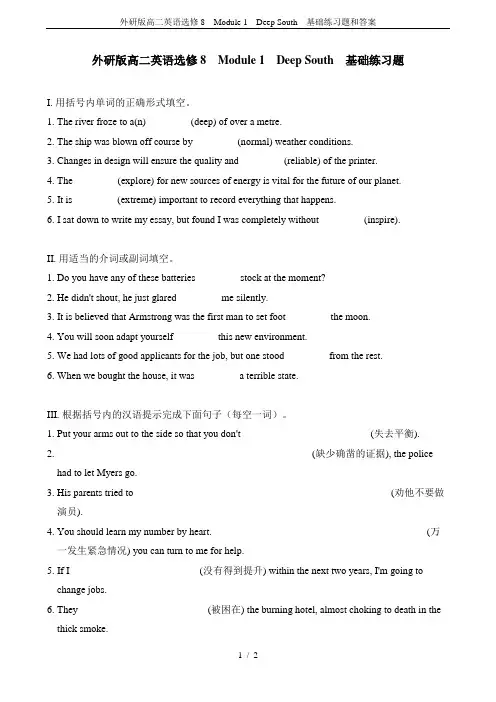
外研版高二英语选修8 Module 1 Deep South 基础练习题I. 用括号内单词的正确形式填空。
1. The river froze to a(n) ________ (deep) of over a metre.2. The ship was blown off course by ________ (normal) weather conditions.3. Changes in design will ensure the quality and ________ (reliable) of the printer.4. The ________ (explore) for new sources of energy is vital for the future of our planet.5. It is ________ (extreme) important to record everything that happens.6. I sat down to write my essay, but found I was completely without ________ (inspire).II. 用适当的介词或副词填空。
1. Do you have any of these batteries ________ stock at the moment?2. He didn't shout, he just glared ________ me silently.3. It is believed that Armstrong was the first man to set foot ________ the moon.4. You will soon adapt yourself ________ this new environment.5. We had lots of good applicants for the job, but one stood ________ from the rest.6. When we bought the house, it was ________ a terrible state.III. 根据括号内的汉语提示完成下面句子(每空一词)。
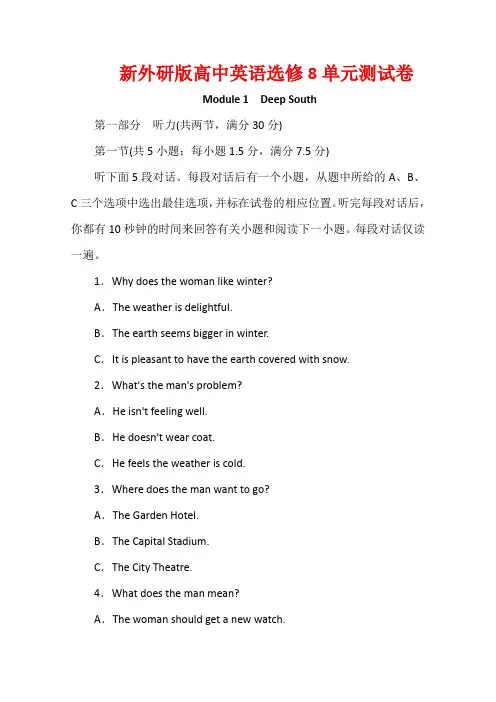
新外研版高中英语选修8单元测试卷
Module 1Deep South
第一部分听力(共两节,满分30分)
第一节(共5小题;每小题1.5分,满分7.5分)
听下面5段对话。
每段对话后有一个小题,从题中所给的A、B、C三个选项中选出最佳选项,并标在试卷的相应位置。
听完每段对话后,你都有10秒钟的时间来回答有关小题和阅读下一小题。
每段对话仅读一遍。
1.Why does the woman like winter?
A.The weather is delightful.
B.The earth seems bigger in winter.
C.It is pleasant to have the earth covered with snow.
2.What's the man's problem?
A.He isn't feeling well.
B.He doesn't wear coat.
C.He feels the weather is cold.
3.Where does the man want to go?
A.The Garden Hotel.
B.The Capital Stadium.
C.The City Theatre.
4.What does the man mean?
A.The woman should get a new watch.。

外研版选修八检测题有答案HEN system office room 【HEN16H-HENS2AHENS8Q8-HENH1688】高二年级第八学段模块检测英语试题第I卷(共105分)第一部分英语知识运用(共两节,满分55分)第一节单项选择(共10小题;每小题分,满分15分)从A、B、C、D四个选项中,选出可以填入空白处的最佳选项,并在答题卡上将该项涂黑。
1.---How long have you been learning English?----About five months.----_________! Your English is so good.A. You can’t be seriousB. You got itC. I couldn’t agree moreD. I’m stuck2.It is obvious that there is a(n)________towards simpler styles in women’s dress.A.consequence B.outcome C.effect D.trend3.The police is________the people to be very careful and not to be cheated online.A.turning to B.appealing to C.referring to D.leading to4.He trains hard,determined to win the game,________the cost. A.however B.no matter C.even if D.whatever5. ________that she is interested in children,I am sure teaching is the right job for her.A.To consider B.Considering C.Considered D.To be considered6.We won’t start the work until all the preparations __________.A. are being madeB. will be madeC. have been madeD. had been made 7.—What does the sign over there read?—“No person________smoke or carry a lighted cigarette,cigar or pipe in this area.”A.shall B.may C.must D.will8. A number of high buildings have arisen ________ there was nothing a year ago but ruins.A. whenB. whereC. beforeD. until9. He smiled politely ________ Mary apologized for her drunken friends.A. asB. ifC. unlessD. though10. Maria has written two novels, both of _______ have been made into television series.A. themB. thatC. whichD. what第二节完形填空(共两篇;第一篇短文10小题,每小题1分;第二篇短文20小题,每小题分;满分40分)AIt’s like getting a new life,I mean,living with the Tragers.Being the oldest kid in Rosario Landing isn’t something you’dbe11.People who go there usually want12kids,babies even,because babies remember little about their real parents,and it’s easier for them to become13to their new parents.I felt happy for those who left with their new families.I really did.14it got harder to be happy for them when you were never the one to go.I never thought Nicole and Thomas would15me.They said they felt like they had16?me for many years.After spending a few afternoons with me,they decided to take me home.It’s never easy to have a17in your life.Lori is nice,but she’s too18,like I was just one of her parents’friends.We talk,but not very warmly.Sean19it better than his older sister I slept in his room before I had my own,and we got to play tricks on each other three nights later,like real brothers.If there’s anything I can do to make them feel easier with me,I’ll try.I want to,because,for the first time in my life,I feel that I20somewhere.11.A.afraid ofB.aware ofC.proud ofD.tired of12.A.biggerB.youngerC.healthierD.happier13.A.familiarB.politeC.kindD.close14.A.AndB.ButC.SoD.As15.A.DickB.seeC.1eave D.catch16.A.keptB.taughtC.known D.helped17.A.boyB.girlC.friend18.A.politeB.pleasantC.amusing19.A.meets withB.deals withC.puts up with D.agrees with20.A.belongB.existC.stayBThe fighting for SUCCESS always begins with a target.But too many people?21through life like steepwalkers. Each day they followfamiliar22,never asking,“What am I doing with my life” And they don’t know what they’re doing because they lack23.Goal-setting is a focusing of the?24to move in a certain direction. Begin With aclear25of what you want.Write down your goals and date them-putting them into26?makes them clearer to you.Rather than concentrating on27objects to acquire and Dossess,focus on satisfying your desires to do,to produce,to contribute,which gives you a true sense of28we all need.It’s important to picture yourself29your goal.What often happens is that30tend to picture the terrible consequences of failure,whilewinners picture the31of success.I’ve seen it among athletes,business people and public speakers.I’ve done it myself.I was afraid of32travel.Friends showed me statistics contrasting air and highway33,but it made no difference,because I had read too many artieles describing34scenes and imagined these scenes vividly.I had programmed myself,without realizing it,to35planes.Then one summer I had the36to fly on a private plane with friends.I didn’t wantto miss a great37.So I spent two weeks imagining a smooth flight and easy38.When the day arrived,I was39to go.To everyone’s surprise,I got on the plane and flew with them without hesitation.I loved40minute of it, and I still use the techniques I employed that day.21.A.runB.marchC.wander D.hurry22.A.routinesB.guidesC.exercisesD.teachers23.A.experiencesB.actionsC.methodsD.goals24.A.1ightB.willC.breath D.blood25.A.impressionB.theoryC.idea26.A.wordsB.heartsC.bags27.A.metalB.cheapC.boring D.valuable28.A.humourB.satisfactionC.directionD.justice29.A.settingB.writing.C.accomplishing D.seeking30.A.1osersB.heroesC.adults D.children31.A.recordsB.awardsC.effects D.rewards32.A.1andB.airC.sea D.desert33.A.speedB.costC.safety D.comfort34.A.crashB.mountainC.ocean D.forest35.A.cut offB.put offC.pay off D.stay off36.A.planB.opportunityC.courageD.strength37.A.trainB.planeC.vacation D.lecture38.A.landingB.travellingC.going D.operating39.A.unwillingB.sorryC.afraid D.eager40.A.aB.everyC.the D.some第二部分:阅读理解(共25小题;每小题2分,满分50分)阅读下列短文,从每题所给的四个选项(A,B,C和D)中,选出最佳选项,并在答题卡上将该项涂黑。
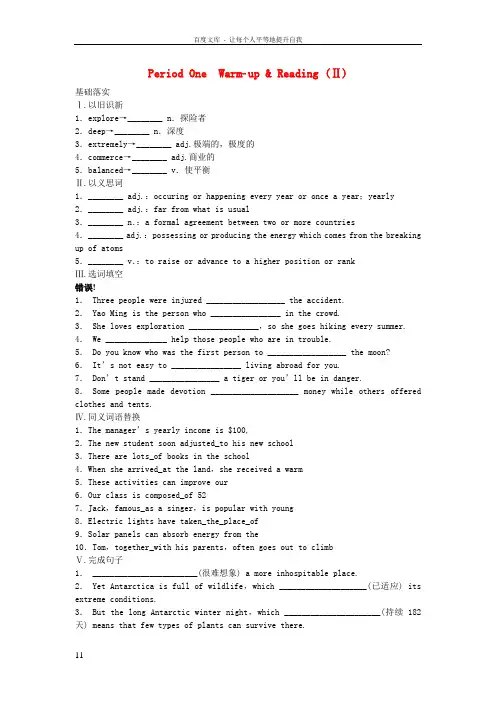
Period One Warmup & Reading (Ⅱ)基础落实Ⅰ.以旧识新1.explore→________ n.探险者2.deep→________ n.深度3.extremely→________ adj.极端的,极度的4.commerce→________ adj.商业的5.balanced→________ v.使平衡Ⅱ.以义思词1.________ adj.:occuring or happening every year or once a year;yearly2.________ adj.:far from what is usual3.________ n.:a formal agreement between two or more countries4.________ adj.:possessing or producing the energy which comes from the breaking up of atoms5.________ v.:to raise or advance to a higher position or rankⅢ.选词填空错误!1. Three people were injured __________________ the accident.2. Yao Ming is the person who ________________ in the crowd.3. She loves exploration ________________,so she goes hiking every summer. 4. We ______________ help those people who are in trouble.5. Do you know who was the first person to __________________ the moon?6.It’s not easy to ________________ living abroad for you.7.Don’t stand ________________ a tiger or you’ll be in danger.8. Some people made devotion ____________________ money while others offered clothes and tents.Ⅳ.同义词语替换1.The manager’s yearly income is $100,2.The new student soon adjusted_to his new school3.There are lots_of books in the school4.When she arrived_at the land,she received a warm5.These activities can improve our6.Our class is composed_of 527.Jack,famous_as a singer,is popular with young8.Electric lights have taken_the_place_of9.Solar panels can absorb energy from the10.Tom,together_with his parents,often goes out to climbⅤ.完成句子1. ________________________(很难想象) a more inhospitable place.2. Yet Antarctica is full of wildlife,which ____________________(已适应) its extreme conditions.3. But the long Antarctic winter night,which ______________________(持续182天) means that few types of plants can survive there.4. Antarctica was the last continent ________________(被发现).5. __________________________________(直到18世纪末) did the British explorer James Cook cross the Antarctic Circle.Ⅵ.单项填空1. The students must master the knowledge and skills necessary for them to ________ the social circumstances.A.stick to B.adapt toC.refer to D.lead to2. Not until I looked at my watch ________ how much time I had wasted. A.didn’t I realized B.did I realizeC.I didn’t realize D.I realized3.Email,as well as telephones,________ an important part in daily communication. A.is playing B.have playedC.are playing D.play4. The foreign visitors were filled with joy when they ________ foot on Chinese soil.A.made B.putC.set D.stepped5. Though well known________ a writer,he is best known________ his musical talent. A.for;as B.from;forC.as;for D.as;as6.—Where did you work 30 years ago?—I worked at the ________ edge of the forest.A.extreme B.severeC.ceremonial D.portable7. Her beauty made her ________ from her classmates.A.stand for B.stand upC.stand by D.stand out8. In fact,________ is a hard job for the police to keep order in an important football match.A.this B.that C.there D.it9. How can you manage to ________ the home life and career as a working mother? A.sacrifice B.abandonC.maintain D.balance10.He ________ be accepted to Beijing University,so he worked hard. A.wanted B.oughtC.aimed to D.got to能力提升阅读理解Doctors say obesity,also known as severe overweight,is a complex doctor may advise medical interventions(医疗干预) in addition to changes in experts say the more successful weightloss plans include a wellbalanced diet and exercise.People who want to avoid weight gain have to balance the number of calories they eat with the number of calories they lose weight,you can reduce the number ofcalories you take in,or increase the number you use,or at the National Institutes of Health say to lose weight,a person should do some moderate or intensive physical exercise most days of the could include fast walking,sports or strength training.A recent study looked at four of the most popular dieting plans in the United at Stanford University studied more than three hundred overweight women,mostly in their thirties or woman went on one of the four plans:Atkins,The Zone,Ornish or women attended diet classes and received written information about the food the end of a year,the women on the Atkins diet had lost the most,more than four and a half kilograms on average.Christopher Gardner led the study,reported in the Journal of the American Medical said the Atkins diet may be more successful because of its simple message to lower the intake of ,he said the advice to increase protein in the diet leads to more satisfying meals.But last week,another report suggested that only a small minority of people have longterm success in at the University of California found that most dieters regained their lost weight within five often they gained back even those who kept the weight off generally were the ones who exercised.1. You are most likely to gain too much weight if________.A.you eat the same number of calories as the number you useB.you take in less calories than the number you useC.you take in more calories than the number you useD.you take exercise regularly on the weekdays2. The third paragraph mainly tells us that________.A.there are four popular dieting plans in the USAB.the Atkins diet has the best effect on losing weightC.lots of women attended diet classes every dayD.dieting plan is the most important3. Which one of the following is NOT right according to this passage?A.The change of your life habits can help you lose weight.B.You’d better exercise once a week to lose some weight.C.The Atkins diet may be good because of lowering the intake of sugar. D.Some people gain weight back for their unhealthy diet.4. Which one of the following is the best title for this passage? A.Successful Weightloss PlansB.Four Popular Dieting PlansC.What Is the Atkins Diet?D.Few People Fail in Losing Weight答案基础落实Ⅰ. 5.balanceⅡ. 5.promoteⅢ. a result of out particular to foot on to to 8.in the form ofⅣ. to of foot on up of as8.replaced well asⅤ. is difficult to imagine adapted to3.lasts for 182 days be discovered5.Not until the late 18th centuryⅥ.1.B 2.B 3.A 4.C 5.C 6.A 7.D 8.D 9.D 10.C 能力提升1.C 2.B 3.B 4.A。
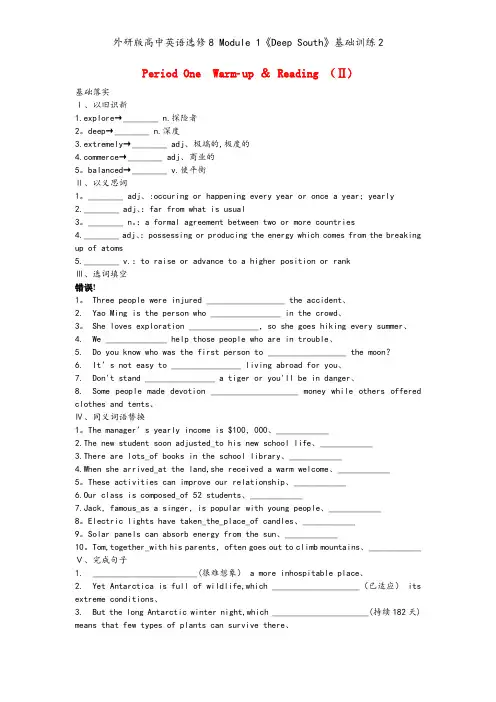
Period One Warmup & Reading (Ⅱ)基础落实Ⅰ、以旧识新1.explore→________ n.探险者2。
deep→________ n.深度3.extremely→________ adj、极端的,极度的merce→________ adj、商业的5。
balanced→________ v.使平衡Ⅱ、以义思词1。
________ adj、:occuring or happening every year or once a year;yearly2.________ adj、:far from what is usual3。
________ n。
:a formal agreement between two or more countries4.________ adj、:possessing or producing the energy which comes from the breaking up of atoms5.________ v.:to raise or advance to a higher position or rankⅢ、选词填空错误!1。
Three people were injured __________________ the accident、2. Yao Ming is the person who ________________ in the crowd、3。
She loves exploration ________________,so she goes hiking every summer、4. We ______________ help those people who are in trouble、5. Do you know who was the first person to __________________ the moon?6. It’s not easy to ________________ living abroad for you、7. Don't stand ________________ a tiger or you'll be in danger、8. Some people made devotion ____________________ money while others offered clothes and tents、Ⅳ、同义词语替换1。

Period Two Integrating Skills基础落实I.课文理解阅读The Travels of Marco Polo,判断正(T)、误(F)1.Marco Polo set off alone on a 25-year journey to China.()2.The book about Marco Polo' s travels was written by Marco Polo.()3.The book described the amazing things in China such as paper money and coal.()4.Marco Polo' s book was a great influence on many future travelers.()II.单词检测1.v.使陷入困境_________漂流,漂泊________储存,储备________阻止:打消……的念头_________居住________2.n.救生船_______(全体)船员________(乘船的)旅行,航行________视力:目力________缺乏;没有________奢侈品________宿舍________食堂,餐厅________紧急情况:突发事件________荣幸________传说:故事________鼓励:启示:灵感________3.adj.轻便的;便携的________干净的:不含有害物质的_________不正常的,反常的________烦人的,令人讨厌的________令人沮丧的,令人抑郁的_________常规的;普通的________脆弱的:易碎的________4.prep.经由,取道 ________零下________III.短语检测1.陷入___________________2.提出;提供________________3.劝阻/阻止某人做某事_______________________4. 如果:假使 _________________ IV. 完成句子1. We won' t go there ____________________________________ (万一下雨)tomorrow ・ 2・ He _____________________ (提出) a wonderful idea at yesterday* s meeting ・ 3. She ______________________________ (劝阻我不要辞职).4・ I _______________________________ (被诱骗告诉了) the police all I knew ・ 5. Winter is __________________________ (令人沮丧的季节). V. 介、副词填空1・ She notices his eyes ____________ particular ・2・ We* 11 fire as soon as the enemy come ________________ sight ・ 3・ Some practical suggestions came ______________ at the meeting ・ 4・ The weather discouraged people _______________ attending ・5・ The thief planned to break ______________ the bank but he failed to break in. 6.11 be absent _________________ home in the afternoon ・ VI. 单项填空1・ The __________ from his eyes encouraged us to set off right now and take a risk to realize our aim. A. emergency B ・ inspirationC ・ reliabilityD ・ privilege2・ He won' t want to eat it unless he* s :really hungry» in _________________ c ase he' 11 eat almost anything ・ A. what B ・ that D ・ which3・ When he moved to Canada> the children __________________ the change very well. A. adaptedC ・ adapted fromD ・ adapted to—Some students have succeeded cheating in the College Entrance Exams. —We do not think such a (n ) ______________ phenomenon will last long. A. fragile B ・ abnormal C ・ delicateD ・ intimate5・ —Don* t tease me.I' m sure he* 11 help me.—Don' t count on him. You will be ______________ • particularly when you are lack of money. A ・ sunburnt B ・ portableC ・ fragileD ・ isolated 6.He flew from New York to Singapore ________________ Bangkok ・A. by B ・ throughC ・ viaD ・ past7・ The doctor' s advice discouraged him _________________ smoking ・C ・ whoseB. adapted themselves to4.A. at B・ in C・ for D・ from 8・ They were walking along the river when a flower ____________________ ・A. came into sight B・ be in sightC・ lose sight of D・ was out of sightit was the girl who a good idea thatB ・ put up with D ・ caught up withthe newelected president is having a hardB ・ settled D ・ to be settled写 作 素 材1. 王老师像对待朋友一样对待每一个学生。
Module 1 Deep SouthPeriod One Warmup & Reading (Ⅰ)基础落实Ⅰ.课文理解1. How much of the surface is covered permanently in the ice cap?A.90%. B.70%. C.98%. D.80%.2. How long does the long Antarctic winter night last?A.12 centuries. B.15 days.C.11 centuries. D.182 days.3. Why are the Antarctic rocks easy to see?A.Because they are white while the background is black.B.Because they are black while the background is white.C.Because they are useful while the background is useless.D.Because they are outer while the background is inner.4. Who was the first to land on the Antarctica?A.James Cook.B.Roald Amundsen.C.Greek geographers.D.Carstens Borchgrevink.5. What was the aim to make the treaty in 1961?A.To stop the commercial and military use of the continent.B.To prevent the research in Antarctica.C.To keep the hunters from killing the penguins.D.To avoid the war between the advanced countries.Ⅱ.课文缩写Antarctica,the coldest place on Earth,is the fifth largest continent in the conditions there are quite with nearly no percent of the surface is covered by ice and strong winds driven by blow from the pole to the ,it is full of wildlife like the famous ,which can to its hard ice there has become a window on the past with gases and minerals in was not until 1895 that a Norwegian called Carstens Borchgrevink set on the Antarctic 1961,12 countries signed a to make it the world’s biggest nature scientists from all over the world go there to study its resources and to work together for progress and peace.Ⅲ.介、副词填空1. With annual rainfall close ________ zero,Antarctica is technically a desert. 2.Antarctica holds 90% of the world’s ice,and most of its fresh water (70%) is ________ a frozen state,of course.3. ________ average it is two kilometres thick,but in some places it reaches a depth ________ five kilometres.4. Yet Antarctica is full ________ wildlife,which has adapted ________ its extreme conditions.5. The rest of the plants are made up ________ mosses,algae and lichen.6. ________ a result,it has become a window on the past,and can give researchers lots of useful information.7. Gases and minerals,________ the form of volcanic dust trapped in the ice,can tell us a lot about what the world’s climate was like in past ages.8. Since most Antarctic rocks are dark ________ colour,they stand ________ against the white background and are easy to identify and collect.9. Then in 1895,a Norwegian called Carstens Borchgrevink became the first man to set foot ________ the Antarctica mainland.10.________ particular,it aims to keep Antarctica free ________ nuclear tests and radioactive waste.能力提升阅读理解ALoch Ness,the largest freshwater lake in the British Isles,is twenty four miles long and,at one point,one mile has an average depth of four hundred and fifty feet and at times drops close to a is cold and murky(浑浊的),with dangerous short,it is the perfect place to hide a monster from even the sharpest eyes of science. The Loch Ness Monster,also called Nessie,is supposedly living in this earliest recorded sighting of the Loch Ness Monster was in the biography of Life of by Adamnan in the year AD monster apparently attacked a man who was swimming in the River Ness. The monster didn’t make headlines again until August 27,1930,when 3 fishermen reported seeing a creature with 20 feet long approaching their boat,throwing water in the 1933,after a new road was built along the edge of the Loch,the number of reports rose in 1934,Author Grant,a young student,was out on his motorcycle one evening when he almost ran into the monster as it crossed the ’s description of the thing—small head,long thin neck and tail with a big body,seemed to match the appearance of the plesiosaur(蛇颈龙),an aquatic(水生的) type of dinosaur that has been extinct(已灭绝的) for 65 million years.The Loch Ness Investigation Bureau was formed in 1962 to act as a research organization for information about the now,efforts have continued to find the great deal of information was discovered about the Loch,but they haven’t yet produced any specific evidence of a monster.Skeptics(怀疑论者) argue that the water in the Loch is too cold for a plesiosaur to live also argue that an airbreathing animal,like a whale or seal,would spend much more time on the surface than the creature seems to,and would be spotted more often.Some scientists have wondered if the sightings might be caused by an underwater wave which is known to sometimes occur in deep,long,and cold lakes,like Loch a wave might push debris(废弃物) to the surface that might look like a strange animal. However,none of these is identified.1. According to the skeptics,which of the following is TRUE?A.It is impossible for a monster to live in cold water.B.The Loch Ness Monster often stays under the water.C.The Loch Ness Monster is an airbreathing animal.D.There is no socalled monster in Loch Ness.2. The purpose of setting up the Loch Ness Investigation Bureau is to________. A.research the plesiosaur in the Loch NessB.protect the Nessie in the lakeC.collect some information about the NessieD.catch the Loch Ness Monster3. Which of the following is the CORRECT order for the things that happened in the passage?a.A young student met with a monster crossing the road.b.A swimmer was attacked by a monster in Loch Ness.c.A new road was built along the edge of the Loch.d.The Loch Ness Investigation Bureau was set up.e.Three fishermen saw a creature swimming towards their boat.A.b,e,c,a,d B.a,b,e,d,cC.b,d,a,c,e D.d,c,e,b,a4. What does this passage mainly talk about?A.The natural scenery of Loch Ness.B.The Nessie.C.Skeptics’ opinions on Loch Ness Monster.D.The Loch Ness Investigation Bureau’s research results.BThe London Eye,which is 450 feet in height above the Thames River,is the world’s biggest spinning is one hundred feet taller than Big Ben,and weighs 1,600 was built to celebrate the year building such a big spinning structure suggested that people longed for bigger and better things in the future.Why did people think of building the London Eye?In fact it was inspired by great structures of the past like the very first observation wheel built for the Chicago World Expo of ’s twice the size of the wheel,but three times lighter,and much more London Eye is keeping natives and visitors entertained and awed (敬畏).In London Eye,there are 32 capsules (舱).Each of the capsules can hold up to 25 they’re air conditioned in summer,heated in these capsules the visitors can see the most beautiful views of London.It was difficult to assemble (安装) and put a wheel of this it required new technology and a lot of parts of London Eye were sent_up the Thames River,and the wheel was assembled on temporary (暂时的) platforms on the it into an upright position was a major took a week to winch (吊) it up to its final position. Now the London Eye is regarded as a monument to new many visitors from all over the world come to visit it.5. How tall is Big Ben?A.450 feet. B.350 feet.C.550 feet. D.250 feet.6. Why did London build the London Eye?A.To set a new record.B.To celebrate the Queen’s birthday.C.To celebrate the coming of 2000.D.To beat the first observation wheel in Chicago.7.The underlined phrase “sent up” in Paragraph 4 probably means ________. A.launched B.set upC.made up D.lifted up8. Which of the following is NOT TRUE about the London Eye?A.It was the world’s biggest spinning structure.B.It can hold about 800 people to see the views of London at a time.C.It was twice lighter than the observation wheel in Chicago.D.The temperature in it can change with the season.答案基础落实Ⅰ.Ⅱ. 5.penguins 9.footⅢ. ;of ;to 7.in ;out ;from 能力提升1.D 2.C 3.A 4.B 5.B 6.C 7.D 8.C。
综合仿真测试Modules 1~2第一部分:英语知识运用(共两节,满分45分)第一节:单项填空(共15小题;每小题1分,满分15分)从A、B、C、D四个选项中,选出可以填入空白处的最佳选项。
1.Your house is always so neat—how do you________it with three children?A.manage B.serveC.adapt D.construct解析考查动词辨析。
manage意指“成功做成/完成困难的事情”,符合题意;serve“服务”;adapt“适应,调整,调节”;construct“建设”,不符合题意。
答案 A2.—Is it all right if I keep this photo?—________.A.No,you don't B.No,it shouldn'tC.I'm afraid not D. Don't keep it解析根据Is it all right,排除A、B两项;D项是命令的语气,不合礼节。
答案 C3.Jenny was looking for a seat when,luckily,a man________and left.A.took up B.got upC.shut up D.set up解析考查动词词组辨析。
take up意为“从事,占据时间或空间”;get up 意为“起床,起立”;shut up意为“闭嘴”;set up意为“建造,搭起”。
答案 B4.In many people's opinion,that pany,though relatively small,is pleasant________.A.to deal with B.dealing withC.to be dealt with D.dealt with解析在某些形容词后经常用不定式的主动形式表示被动,此时,不定式动作和句子主语存在动宾关系。
Period Three Grammar基础落实Ⅰ.用所给词的适当形式填空1. 60% of the exports ________ (be) from China,which is a big number.2. The friendship between the west and east was ________ (promote) after Marco Polo came to China.3. His hard work ________ (lead) to his success while her carelessness caused her failure.4.I’m proud of my mother’s job,which is __________ (clean) the streets. 5. It was ________ (surprise) that Zhang Hua,a 13yearold boy,helped the old man out of the fire.Ⅱ.翻译句子1.据说有五个科学家已经动身前往南极洲了。
________________________________________________________________________________________________________________________________________________2.年轻人应该尊重老年人。
________________________________________________________________________3.那个地区90%的人口都是农民。
________________________________________________________________________4.我们不得不迅速适应新制度。
外研版高二英语选修8 Unit 1单元训练卷一、单词拼写1.If you fail your driving test for the first time, don't be d.2.He is a fine musician; it's a p to hear him play.3.We have found some of the rare species that i the area.4.Buying a house can be a very t business.5.This door should only be used in an e.6.He(对待.......... 如朋友)me when I was young.7.The incident cast doubt on her motives and(可靠性)。
8.The bad news is(令人沮丧的)。
9.It was a speech full of(难以理解的)political jokes.10.The prisoner was set free in the(缺乏)of firm evidence.二、根据括号内所给的提示翻译下列句子1.尽管这位教授详细地讲解了这一点,但许多学生仍然不理解。
(in great detail)2.他除了偶然生过一次小病外,似乎非常健康。
(exceptfor)3.这项运动旨在使人们意识到吸烟的危害。
(aim to)4.这段文字意义晦涩。
(obscure)5.没有灵感我无法写作。
(inspiration)6.你能想像我游过那条河吗?(imagine)三、语法填空阅读下面材料,在空白处填入适当内容(不多于3个单词)或括号内单词的正确形式。
AA group of frogs were traveling through the woods, and two of them fell into a deep pit (坑).When the other frogs saw how deep the pit was, they told the two frogs that they were as good as 1(death). The two frogs didn't listen to the others and tried to jump out of the pit with all 2 might. The other frogs kept telling them to stop. Finally, one of the frogs heard what the other frogs 3 (say) and gave up, so he died.The other frog went on jumping as hard as he 4 . Once again, the other frogs cried at him and told him to stop and just allow himself to die. He jumped even 5(hard) and finally made himself out. When he got out, the other frogs said, "Didn't you hear us? " The frog explained 6 them that something was wrong with his hearing. He thought they were encouraging him 7 whole time.There is power of life and death in the tongue. An encouraging word to someone 8 is down can lift him or her up and help them make it through the day. Be careful 9 what you say. Speak life to those who cross your path. The power of words一anyone can speak bad words that rob another of the spirit to go on in difficult times. But an 10 (encourage) word can go sucha long way.1. 2.3.4.5.6.7.8.9.10.BRyan: Did you have a good vacation, Katie?Katie: Yeah! It was 1 (excite)? Probably my 2 exciting vacation ever!Ryan: Wow! What did you do?Katie: I took a nature 3 (冒险)tour.For the first part, we went 4 (hike). It was so much fun! We hiked all the way 5 these beautiful waterfalls. I took lots of pictures.Ryan: Sounds great. So, what else did you do on the tour?Katie: Well, the best part was at the end of the trip. We went skydiving. Can you believe it? I jumped 6 an airplane. Ryan: Wow!Katie: Yeah, it was just a fantastic vacation.How did you spend your break, Ryan?Ryan: Oh, I 7 (drive) to visit my relatives.Katie: Oh-huh. Did you have a good time?Ryan: Well, it was pretty boring, 8.lt rained every day 9 we had to stay inside. We just stayed home and watched TV a lot. Katie: Oh, that's too bad.Ryan: No, that*s OK. It really was very relaxing, 10 it was a little boring.1. 2.3.4.5.6. 7.8.9.10.四、完形填空So far, about 27 countries have visited Antarctica for scientific research.Hard 1 the living conditions are, many scientists 2 to stay there for long periods of research.So, how do they manage their lives on the ice?WelL during the 3 , the temperature in Antarctica reaches about 20°C .It falls to about —60°C in winter. So,4 there are 24 hours of sunshine, scientists must keep wearing all the correct clothes to5 themselves from the cold. These clothes include jeans, running shoes, jackets, long underwear, boots and woolen socks.Although highly technical clothing provides much 6 against the extreme cold, scientists often need to 7 when there is anicy wind blowing and the temperature is —30°C so natural protection such as facial(面部的)hair can also 8 .That's 9 many researchers wear a 10.lt really does keep you warm.Usually, the polar researchers have 11 meals.Some 12 have feasts(盛宴)on holidays like Christmas and New Year's Day. 13 are always welcomed and usually finished quickly.Life on the ice means living with other researchers in 14 living space. Most people sleep in dorm-style rooms. Some remote field camps use 15 tents.So, at least some researchers won't be 16 by annoying snores(鼾声).But what do they do for 17 in their spare time? There are actually a lot of things they can do. They watch movies, read tons of books, listen to music, paint and ski. Some 18 researchers might even do some knitting(^ 织).It is important for a polar researcher to be in good physical condition. They can be required to _ 19 to heights of more than 3,000 metres and the Antarctic atmosphere has less oxygen than that of any other 20 .1. A. as B. but C. because D. unless2. A. supposed B. used C. ought D. have3. A. spring B. summer C. winter D. autumn4. A. as if B. as long as C. even though D. in case5. A. prevent B. separate C. free D. protect6. A. water B. food C. air D. protection7. A. go outside B. stay indoors C • sleep on ice D. work at home8. A. help B. do C. mind D. depend9. A. how B. where C. why D. when10. A. hat B . shirt C. raincoat D. beard11. A. bad B. good C. sweet D ・ common12. A. even B. still C. ever D. yet13. A. Books B. Vegetables C. Songs D. Letters14. A.B. bright C • tight D. bigcomfortable15. A. common B. advanced C. small D. separate16. A. caught up B. kept up C. made up D. bothered17. A. sports B. fun C. work D. research18. A. women B. man C. polar D. Russian19. A. skate B. run C. climb D. fly20. A. state B. city C. continent D. country五、阅读理解For more than nine days, for more than 60 miles, thousands of Beijing-bound vehicles have come to an almost total stop on highways called the 6 and 110 that run from Inner Mongolia southeast to the nation's capital.Bai Xiaolong, a 30-year-old truck driver, says it took him five days to make the 350-mile journey from Inner Mongolia to Tianjin. He spent much of that time reading, text-messaging and sleeping rather than speeding up."There was one day that I didn't move, not even an inch, "said Bai, an inhabitant of lining in Inner Mongolia, a city at the western end of the traffic jam.Chinese officials said that the congestion is mainly because of the maintenance^tP )proj ects that began in mid-Augustand are scheduled to be completed in mid-September. Trucks carrying 8 tons or more of coal or fruit have been responsible for damaging the roadway, thus making the work necessary.Drivers who often use the route know that heavy traffic has long been a fact of life/'The problem is really that there're too many cars and trucks and not enough (车道),"Bai said.46We drivers are used to this sort of thing happening.^, The two national freeways are heavily used by trucks carrying coal from the recently opened fields of Inner Mongolia to China's coastal cities.The seemingly endless jam began on the 6 and spread to the 110, which runs (平行的),when officials sought to ease the traffic on the 6.The Global Times, and English-language newspaper, said the jam had eased somewhat in the last two days, but inhabitants of the region say the congestion simply spilled out onto other roads.The congestion has created an economy of its own. Vendors^®)sell boxed lunches, noodles and drinking water to the travelers, often at jacked-up prices. And because of the long-standing problems along the highways, dozens of small hotels have appeared, attracting drivers who need a stop to catch more serious sleep.1.According to the text, the 110 was mainly damaged by.A.too many carsB. bad weatherC. poor maintenanceD. heavy trucks2.What can we infer from the text?A.Bai Xiaolong was bom in Tianjin.B.The problem of traffic jams in China will be solved soon.C.Chinese officials think it is necessary to build more lanes.D.The local people don't think the congestion has eased.3.The underlined word t4jacked-up^in the last paragraph probably means"A. highB. rightC. specialD. low4.What would be the best title of the passage?A.The congestion creates an economy of its ownB.Traffic jam near Beijing stretches on for daysC.The traffic has improved in BeijingD ・ Truck drivers in China live a hard life六、短文改错假定英语课上老师要求同桌之间交换修改作文,请你修改你同学写的以下作文。
模块质量测评(一)Module 1Deep South(时间:90分钟满分:110分)第一部分阅读理解(共两节;满分30分)第一节(共10小题;每小题2分,满分20分)阅读下列短文,从每题所给的四个选项(A、B、C和D)中,选出最佳选项。
AEating greenHow to make daily food choices to improve your diet while helping the environment:Tap the tapDrink tap water to eliminate your use of individual plastic water bottles; buy a reusable water bottle instead.Cook at homeSave energy by making larger portions (份) and freezing the leftovers for additional meals. Microwave or steam (蒸) foods.Go organicLook for the USDA Organic seal (印章) on fruits and vegetables that were grown without chemical pesticides (杀虫剂) or fertilizers.Vary your proteinsReplace meats with beans and nuts; less energy is used for these compared to what is needed for beef and poultry (禽肉).Buy directFind local sources for your food; they may be fresher and contain less packaging.Home grownPlant your own vegetable garden.1.The purpose of the passage is to ________.A. explain the relationship between people's diet and healthB. teach people how to eat in an environmentally-friendly wayC. list unhealthy lifestyle choices that people should avoidD. inform people of different ways to save energy in daily life答案与解析B写作意图题。
Module 1 Deep South 新课标词汇polar a.北极的;南极的;极地的penguin n.企鹅*explore[ik`spl :] v.探险;探测;探究explorer n.探险家;勘探者Antarctica[✌⏹♦♦♓☜] n.南极洲*annual [`✌nju☜l] adj.年度的;每年的*rainfall [ ❒♏♓⏹♐●] n.一场雨;降雨量state [♦♦♏♓♦] n.状态;情形;国家;(美国的)州*depth [♎♏☐] n.深;深度*gravity [`♑r✌viti] n.重力;地心引力extreme [ik`stri:m] a.极端的;极度的*adapt [☜`d✌pt] v.使适应,使适合;改编*trap [♦❒✌☐] n. 陷阱vt.使陷入困境*mass [❍✌♦] n.团;块;堆;片;群;众多;大量balance [ ♌✌●☜⏹♦] n.平衡;天平v.使平衡treaty n.条约;协定;约定;协议;契约*commercial [k☜`m☜:☞☜l] a.商业的nuclear [ ⏹◆●♓☜] a.原子核的;原子能的test [♦♏♦♦] vt.&n.测试;考查;试验*radioactive[❒♏♓♎♓☜◆✌♦♓]a.放射性的*promote [☐❒☜❍☜ut] v.促进;发扬;增进*via [`vai☜] prep.经由;途经lifeboat n.救生艇,救生船*crew [ ❒◆] n.全体船员;全体乘务员voyage [ ♓♎✞] n.航行;旅行*glare [♑●☪☯] v.瞪眼;闪耀n.刺眼的强光intense a.强烈的,剧烈的;极度的*severe [si`vi☜] a.严重的;严厉的;艰难的;艰巨的eyesight [ ♋♓♦♋♓♦] n.视力;视觉*sun-burnt [ ♦✈⏹♌☜♦]a.晒黑的;日灼的minus [ ❍♋♓⏹☜♦]prep.&a.负的;减去的;零下的*numb [n✈m] a.麻木的;失去知觉的frost [♐❒♦♦] n.霜;霜冻;冰冻;严寒clothing [ ●☜◆❆♓☠] n. (总称)衣服*portable [`p :t☜b☜l] adj.轻便的;便携式的*pure [☐◆☜] a.纯的;不含有害物质的*abnormal[æb'n :məl ]a.反常的;不规则的absence[ ✌♌♦☜⏹♦]n.不在;缺席;缺乏;没有daylight [ ♎♏♓●♋♓♦] n.日光;白昼;黎明*tiresome [ ♦♋♓☜♦☜❍] a.无聊的;烦人的aircraft [ ☪☯❒♐♦]n.(单复数同)飞机;航空器platform[ ☐●✌♦♐❍]n.(平)台;讲台;月台;戏台powder[ ☐♋◆♎☜]n.粉;粉末*minimum[ ❍♓⏹♓❍☜❍]a.&n.最小量;最小数*maximum [ ❍✌♦♓❍☜❍]a.&n.最大量(的) modest [ ❍♎♓♦♦] a.谦虚的;谦逊的;适中的luxury n.奢侈;奢华;奢侈品cosy [`k☜uzi] adj.暖和而舒适的dormitory [ ♎❍♓♦❒♓](缩dorm) n.宿舍;寝室canteen[ ✌⏹♦♓⏹] n.餐厅;食堂;小卖部*laundry [ ●⏹♎❒♓] n.洗衣店;要洗的衣服*discourage [♎♓♦✈❒♓♎✞]vt.使泄气;使沮丧emergency[♓❍☜♎✞☜⏹♦♓]n.紧急情况*conventional [k☜n`ven☞☜l] a.传统的;常规的drill [♎❒♓●]n.钻(头);钻床vt.钻(孔);训练;操练*fragile[`fr✌d✞ail] a.易碎的;脆(弱)的;虚弱的battery [ ♌✌♦☜❒♓] n.电池;蓄电池*ecology [i`k l☜d✞i] n.生态(学)*delicate [`delikit]a. 娇气的;纤弱的*privilege [`privilid✞] n.特权;特殊的荣幸trader[♦❒♏♓♎☜] n.商人jewel[ ♎✞◆☜●]n. 宝石jewellery[ ♎✞◆☜●❒♓]n.(总称)珠宝;首饰tale [♦♏♓●] n.故事; 传说reliable [ri`lai☜bl] a.可靠的;可信赖的reliability n.可靠;可信赖性*inspire [♓⏹♦☐♋♓☜]vt.鼓舞;激励;激发inspiration n.灵感;鼓舞;启示*souvenir[ ♦◆☜⏹♓☜]n. (旅游)纪念品;纪念物*permanent [`p☜:m☜n☜nt] a.永久的;持久的*temporary [`temp☜r☜ri] a.暂时的;临时的*mineral [ ❍♓⏹☜❒☜●] n.矿物质;矿物*identify[ai dentifai] v.识别;鉴定;辨认;确认*represent [❒♏☐❒♓♏⏹♦]vt.代表;表现;表示;描绘重点短语及词组adapt (oneself) to (使自己)适应(习惯)于set foot in / on 到达;进入;踏上test on …在…(身上)做试验discourage … from doing …打消…做…的念头in case of如果;万一in case 假使;以防;万一in the form of 以…的方式/形式stand out 杰出;突出;显眼;醒目in particular 特别地; 尤其free from 使摆脱;无…的come into sight 出现在眼前;可以望见reply to 回答;答复break up 打破;弄碎;结束;制止;散开;驱散come up 前进;进来;上升;长出;被提出come up with 提供;提出when it comes to当涉及到,当谈到on balance 总而言之;总的说来in the balance 成败未定;悬而未决keep one's promise遵守诺言run in the family 世代相传keep up振作精神;保持(习俗);维持重点词语精练1. 单项选择:1) Zheng He succeeded in making a _________ across the Indian Ocean for the purpose of developing the relationship with the other countries.A. travelB. voyageC. journeyD. tour2) Johnson King is a fine musician; it’s a ___________ to hear him play.A. privilegeB. absenceC. inspirationD. convenience3) My parents thought it was _________ for a boy to be interested in ballet.A. conventionalB. severeC. abnormalD. numb4) Joanna is a _______ girl so her mother pays much attention to her nutrition.A. stoutB. slimC. stubbornD. delicate5) --- Carl is such a (n) ______ person in our office, isn’t he?--- Yes. Once he promises to do something, he’ll make it.A. independentB. reliableC. ableD. considerate6) He's been taking this part-time job for over a year now and wants a _________ job.A. positiveB. temporaryC. permanentD. portable7) Students nowadays should make full use of their time to equip themselves with knowledge so that they can easily __________ to the competitive society in the future.A. adaptB. adoptC. applyD. suit8) On the American flag, there are altogether fifty stars and each star _________ one state.A. presentsB. expressesC. replacesD. represents9) The manager ________ the pros and cons (利弊)of the situation over and over again before making a final decision.A. balancedB. measuredC. examinedD. judged10) Someone who lacks staying power (耐力) and perseverance (毅力) is unlikely to _______ a good researcher.A. promoteB. makeC. appointD. courage11) Mrs. Smith was not conscious of the risk she was _______ when she ran through the forest after the two men.A. turningB. makingC. puttingD. taking12) Ms. Chen always encourages her students to _______ their spirits whenever they are on thepoint of giving up.A. take onB. pick upC. keep upD. go on13) They fell in love at first sight but they eventually ______ because they had little in common.A. broke upB. broke outC. broke throughD. broke into14) My mother always keeps a supply of candles in the house ________ power failure.A. in caseB. in case ofC. in the case ofD. in that case15) The guide intended to _______ them _____ the mountain because of the bad weather.A. encourage; to climbB. discourage; to climbC. encourage; from climbingD. discourage; from climbing16) We will support _______ will take over the company as our new manager.A. whateverB. whomeverC. whoeverD. whichever17) It is a waste of time ______ such a person to join us because he will never change his mind.A. your persuadingB. you persuadedC. of you to persuadeD. for you persuading18) _______ is required in that situation _______ we be present.A. What; whetherB. It; whatC. What; thatD. It; that19) ---Did you see a letter on my desk?---No. You'd better ask the first one ______ the classroom.A. to enterB. to have enteredC. enteringD. having entered20) ---Your grandpa was allergic to onions and so am I---I think ________. Me too.A. it is the same with youB. it's true for meC. it runs in the familyD. it works in the family2. 选用方框内所给的词或词组的适当形式填空:1) Her help was critical during the ________ which was an unexpected and dangerous situation.2) In the __________of water, plants don't grow.3) Education should not be considered to be a ___________ in a modern society.4) Many poets and artists have drawn their ____________ from nature.5) When my uncle went abroad to live, he left me his watch as a ___________.6) Guangzhou is the _____________ capital of China's Pearl River area.7) The humans are destroying nature day by day, and it of course, will cause________ punishment from it sooner or later.8) My feet were _________ from the cold after spending all afternoon ice skating.9) Julie wants to buy a __________ computer so that she can carry it around when she travels.10) If the water is ________, it will not need further treatment.11) Some students have succeeded in cheating in the entrance exam. I don’t think such ________ phenomenon will last long.12) He's got a drawer full of medals but he's too _________ to show off them.13) Internet connections through _____________ phone lines are fairly slow.14) Glasses are _________ and must be handled with great care.15) It’s so good to have a __________ friend when you are in trouble.16) The ______ Tsingtao Beer Festival attracted many people from home and abroad.17) Students should _________physical exercise and studies. Without a sound body one cannot achieve anything.18) Before a new type of airplane goes into service, every part of it is ________ again and again.19) My brother has been ___________ to general manager because of his excellent work in the company.20) It hasn't rained for months. The farmers have to _______wells for water.21) Mr. Zhao’s enthusiasm has _________ Lu Hao to concentrate more on History lesson s and his grades have improved a great deal.22) What I am saying ____________ what many of my classmates truly think.23) Many animals and plants, which couldn’t _________ the sudden change of the climate, diedout. Dinosaurs are one such example.24) Considering the difficulty of looking for a new job, I _________ him ______ giving up the present job.25) Since most Antarctic rocks are dark in colour, they ___________ against the white background and are easy to identify and collect.26) Living in the country, one can be ______________the noise and air pollution of the town.27) After a long discussion, the experts finally ________________ suggestions for keeping the balance of nature in this area.28) Despite some mistakes, his composition is a fairly good one ___________.29) Someone enjoys climbing the mountain which others never ____________.30) Most of us know we should cut down on fat but knowing such things isn’t much help when it ___________ shopping and eating.3. 根据汉语意思完成下列句子:(每空一词)1) 好习惯很重要。